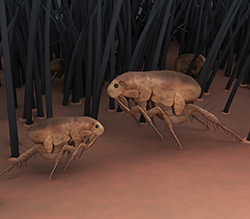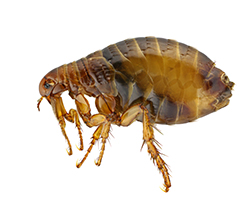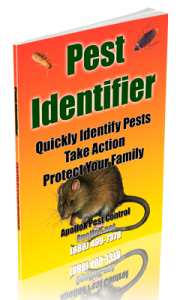 Flea Control In CT: The Mighty Flea
Flea Control In CT: The Mighty Flea
Let’s start with some astonishing facts about fleas:
- Fleas are fast and can travel at speeds up to one mile per hour. In flea distance, this is equal to over 100 miles per hour. Result: The fleas that are anywhere within 24 miles of your home could be in your home tomorrow!
- But it gets even crazier. The flea that found its way into your home can survive there for up to a year–for two months without food!
- Flea eggs last a long time, and can lie dormant for up to 2 years before hatching. So, that flea problem you think you got under control a year and a half ago could suddenly come back.
- How many fleas could there be? The fleas on your pet represent only 5% of the fleas in your home, because that’s about how often they’re actually on a pet. One estimate has it that for every flea you find on your dog or cat, there are 75,100 additional fleas living in the house!
Flea Control: Why bother?
Fleas defecate as they feed, and so transmit disease and parasites such as tapeworms. When the infected areas are scratched, the murine typhus pathogen can be transmitted from their infected feces into the wound. Fleas are responsible for transmitting the plague which decimated medieval Europe taking 25 million lives. More commonly, fleas cause allergic dermatitis in some pets…and people.
For these reasons and more, a flea problem can be far more than a problem for your pets to endure. If you notice fleas on your pets, the safety of your family is at risk.
 Flea Control In CT: What Are the Necessary Basics?
Flea Control In CT: What Are the Necessary Basics?
Treat the Entire House
As noted, flea eggs can lie dormant for up to 2 years before hatching. So it’s going to take a long term strategy to ensure a flea infestation is under control. Treating you pet isn’t enough. Remember, for every flea you see on your pet, there are over 75,000 others in your house. You’ll need to treat your entire house, and your yard at the least, and persistently repeat the treatment until every dormant egg has hatched–over a period of a couple years.
Vacuum Often, and Effectively
Salt can eat through flea eggs, so sprinkling salt on the carpets before vacuuming can strengthen the effect. It’s been suggested that you vacuum up a few teaspoons of flea powder into the bag to help kill the fleas you vacuum up. Be sure to discard the vacuum bag outside the home, sealing it in a plastic bag.
Sprays and Foggers
Sprays containing methoprine or chlorpyrifos have the residual ability to kill hatching fleas, and they can be used on furniture and carpets, but not directly on your pets. Flea foggers can be effective when used twice—three to six weeks apart, but all people and animals must be removed from the house during use.
 Treat Your Yard Simultaneously
Treat Your Yard Simultaneously
As you treat your home and pets, simultaneously treat your yard at 14-day intervals. This can be effective on non-rainy days any time of year except during the cold winter months. If you yard is large spray it with chlorpyrifos. If smaller, dust with malathion or diazinon following the directions on the label.
Flea Control In CT: Treating Your Pets
Treat all pets in your household at the same time, and simultaneously as you treat your home and yard. A flea shampoo followed by applying a flea repellent is a good start. If you have young pets, you’ll need a product safe for them vs. using a product made for adult pets. Carefully follow the directions on the label to avoid harm to your pet.
Flea collars have limited effectiveness. They can irritate young pets, and at best, are effective in keeping fleas off the head and neck area.
 Flea Control In CT: Call In the Professionals
Flea Control In CT: Call In the Professionals
Due to the resilience of fleas, and there persistence in infesting a home over time, the most effective and sure solution may be calling in a professional flea exterminator who guarantees their work. Considering what’s at stake for your family and pets, the cost is far more reasonable than potential medical and veterinary expenses.
















Recent Comments